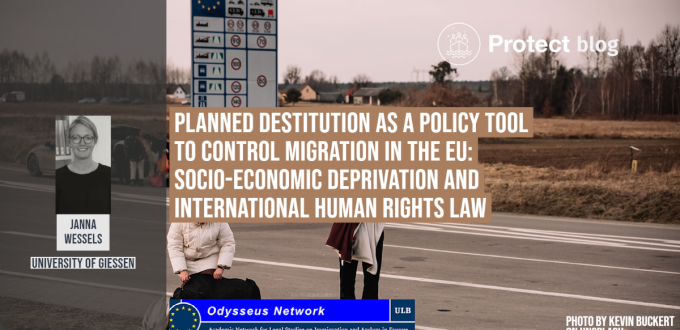Policies of ‘planned destitution’ in the EU The increased use of social and economic exclusion as a policy tool with a view to managing certain groups of ‘undesirable’ migrants is one of the major trends in European asylum and migration policy. While this already occurs under the current legislative framework, the most recent reform proposals tabled by […]
Can Russians refusing to perform military service claim asylum under EU law?
As Professor Elspeth Guild and I discuss in a recently published PROTECT Policy Brief, in both international refugee law and in EU law, people fleeing punishment or persecution for seeking to avoid conscription to fight in a conflict in which war crimes are taking place are entitled to seek and enjoy protection as a refugee. […]
Migration as a polarizing issue on social media
Social media are one of the main arenas in which European citizens discuss policy issues such as migration and in which opinion formation on such issues takes place through the sharing and consumption of information and views. At the same time, it is an arena in which traditional and alternative media, NGOs, and politicians share their views on migration and interact with citizens to promote their agenda. For this reason, social media are a melting pot of different actors and interests, and a lens through which the European discourse on migration can be studied. Social media offer both, a huge potential for, on the one side, the free and democratic exchange and, on the other, for polarization and manipulation of the European discourse on migration.
Comparing Policy Actors’ Interaction with Each Other in Political Communication of Refugee Protectio
Opinions of policy actors on migration and refugee policy are increasingly polarized due to the various economic and migrant “crises”. Especially in the current context of these crises, governments have to engage increasingly more in information-spreading activity to persuade their citizens to support their international commitment to protect refugees. Micro-blogging platforms like Facebook, Twitter, Reddit, and YouTube, which are not subject to strict fact-checks and 4 editor-scrutiny like conventional media, empower policy actors without the necessary resources for expensive media campaigns and with non-mainstream political preferences.
“The US is not safe for asylum seekers” – Federal Court of Canada strikes down the Canada-US Agreeme
The Federal Court of Canada has determined that the Canada-US Safe Third Country Agreement (STCA) infringes upon asylum seekers’ right to international protection and has given the Parliament six months to take necessary action. Until then, Canada can continue handing over asylum seekers to the US officials, exposing them to arbitrary detention and the possibility of immediate deportation to the countries where they have fled persecution or other life-threatening situations. The Federal Court should rescind the STCA immediately, not six months from now, say PROTECT researchers, Idil Atak, Zainab Abu Alrob and Jona Zyfi in this blog piece.
The challenge of making academic research feed into policy debates: three lessons to take away from ...
Academics play a significant role in public policy debates, providing evidence-based advice and offering a measured voice. But researchers’ engagement should not a one-way street: academics also have to make sure they listen carefully to the needs of the public and provide them with advice and research of real use. Three main lessons from the Brexit process might help us along the way.
How is the Corona pandemic affecting the lives of refugees, asylum seekers, and migrants in Greece a...
In this blog post Dr. Theofanis Exadaktylos from University of Surrey, UK and Professor Francesca Longo from University of Catania, Italy address the situation for refugees, migrants and asylum seekers in Greece and Italy.







